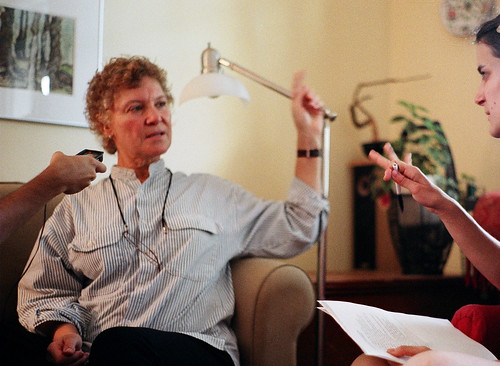
Historian Michelle Guitard put us in touch with Michele Quenneville because we wanted to learn about parking lots in Hull from a resident’s perspective. The Impervious P-lot personnel interviewed Michele in her home a few blocks over from the grey buildings.
Michele Quenneville is an environmental activist and retired translator who, in her spare time, works with various community groups to plant trees, set up and tend community gardens, and create a food co-op in the presently food-insecure Hull. She hates concrete and paved surfaces. So, naturally, she is upset about the many parking lots she lives surrounded by. She told us, “You live in a desert when you live in a street with just parking lots!â€
Although the larger, legal lots, like those of Marc Dubé, are of concern to Michele, during our interview the discussion focused mostly on the smaller illegal parking spaces her neighbours operate. While Michele is making plans to rip up the concrete in her backyard and plant some trees and a garden, her neighbours are smothering the grassy areas around their houses with gravel or pavement so that they can be used as parking. Or they’re making parking out of the spaces where dilapidated buildings once stood.
It’s two things: federal civil servants need a parking space during the day, and the car owners in the area need parking at night because it’s very dangerous to have your car on the street. So for those reasons you get a lot of backyards being paved. People are making money. We have people who have moved — not just this next house, but the one after — they moved about a year ago. First thing they did is rip out all the grass and a couple of shrubs that were in the backyard, just graveled it over, and you know, 15 cars are in there.
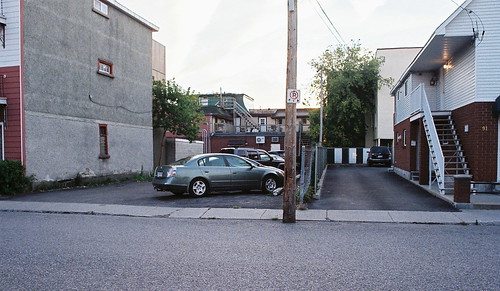
There are three illegal activities going on with these small lots: one, people are operating parking lots and spaces in residential zones; two, in most cases they’re doing so without permits; and, three, people are paving over more than the legal limit allows. Michele is frustrated by how Hull deals with these misdemeanors and by the lack of public education measures taken to prevent illegal lots from being made. As a resident, all she can do is make a formal complaint after the fact, which she says is like “squealing on your neighboursâ€.
We have an excellent councilor. She’s the one that suggested, look you can’t just write to me and say your neighbour paved over his lawn, you have to lodge a proper complaint because that is the mechanism that gets the city going. So we do have a way of influencing and expressing ourselves about pavement in Hull. But not a lot of people know about it, and a lot of people are reticent. I mean, I was — complain about my neighbour?! It’s no fun. But there is no other mechanism.
Michele and a likeminded friend have an alternative solution to the problem:
I complain a lot. I get my girlfriend across the way to complain a lot. And we have asked the city, like for example, we wanted to know whether you need a permit to pave. You don’t need a permit to pave. So now we’re trying to hassle the city. Why don’t you make it so that you need a permit to pave? Then you can tell them how much they can pave. Because you’re only allowed, I think it’s ten metres, which is only a laneway for a car. Maybe it’s less than that. Anyways, it’s enough for a laneway next to a house. But people are paving the laneway and the grass.
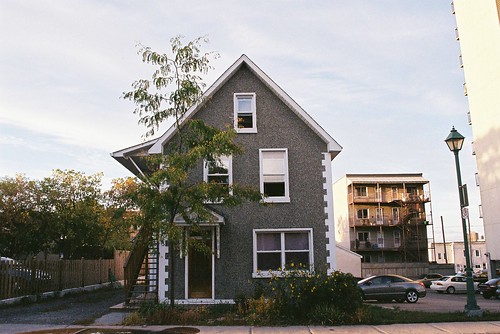
Despite Michele’s bright efforts, Hull is becoming more and more stratified by hot patches of grey. The result of all these little illegal parking lots is a neighbourhood with, as Michele described it, “holes in the middleâ€.
There’s no continuity on many of the streets. Like for example, this across the street. And as soon as you get an empty lot, given that you can get seventy to a hundred-and-ten bucks a car, per month, people just try to make money out of it. Anyway, you can understand that. There’s no rule in place and people aren’t conscious. Anyway that’s what we’ve got to change.
Amber Yared is one among a group of artists, writers, educators, and architects working on The Impervious P-lot, a Hull-based CUP project about parking lots and what they do besides store cars. She will be posting her findings on the Spacing Wire as the project progresses.

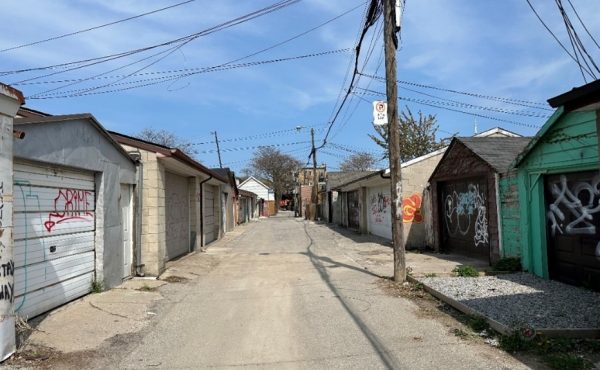
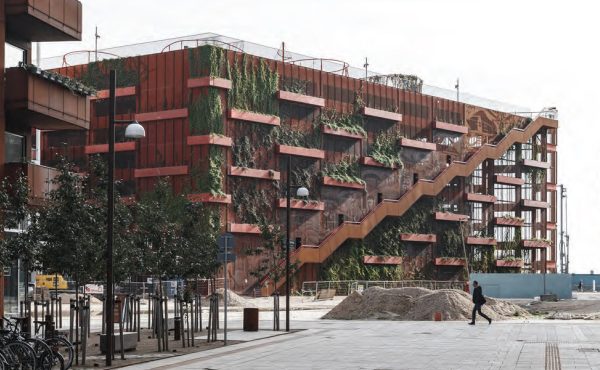
9 comments
Depressing! Have to think that of it wasn’t for the Centretown Plan in 1975 much of downtown Ottawa would look the same…
This neighbor-on-neighbor animosity over trivial issues (which, I’m sure, seem really important to the participants) is exactly why I choose to avoid owning a house.
I would add as a Toronto sidebar that I have been interested in the large number of what I believe are illegal parking spots on front lawns (covered by cement) in my area. Hard to believe but people with legal pads are supposed to post small plates with the permit number….I have yet to see one on the hundreds of spots in my area. SO, you cannot just look it up, or call and ask about an address, you actually have to write a letter to Nino Pellegrini the district manager and wait for a letter back. Doesn’t sound like very thorough enforcement to me. I would add that I am not against pad parking per se as long as it adheres to green standards for runoff and doesn’t cut down trees.
En masse, I’m not sure this is a trivial issue, Andrew.
“This neighbor-on-neighbor animosity over trivial issues (which, I’m sure, seem really important to the participants) is exactly why I choose to avoid owning a house.”
Not sure what your alternative of choice is. If it’s a condo, read the guy in the Star who answers letters about condo boards. Plenty of petty to be found there.
@Scott D – I’d post my badge on my parking pad… if the City would get around to sending it to me.
Mark D.
Scott: I noticed some bollards installed in front of a parking pad on Symington, probably up around Antler St. Don’t know what the story is behind that one, but it makes me wonder if the City said, “Nope, that parking pad’s not legal. Here are some bollards to prevent you from driving up onto your paved front lawn.”
Its surprising to read that private residencies are giving up the little outdoor space they have to accommodate the population of civil servants that don’t – through no fault of their own – seem to contribute to the greater good of the neighborhood. I think it’s great that Michele Quenneville cares enough about Hull to complain about the illegal parking lots. I say this especially since I can’t imagine Hull is an easy place to love.
Vic I need to take another look. I know there are lots on the narrow section of Symington north of Dupont to stop people parking on the sidewalk.
Its surprising to read that private residencies are giving up the little outdoor space they have to accommodate the population of civil servants that don’t – through no fault of their own – seem to contribute to the greater good of the neighborhood.
Oh, not that surprising. It’s a gold mine. My landlord used our backyard as one. (He still does, I mean. I’ve long moved on from Hull, that’s all.)